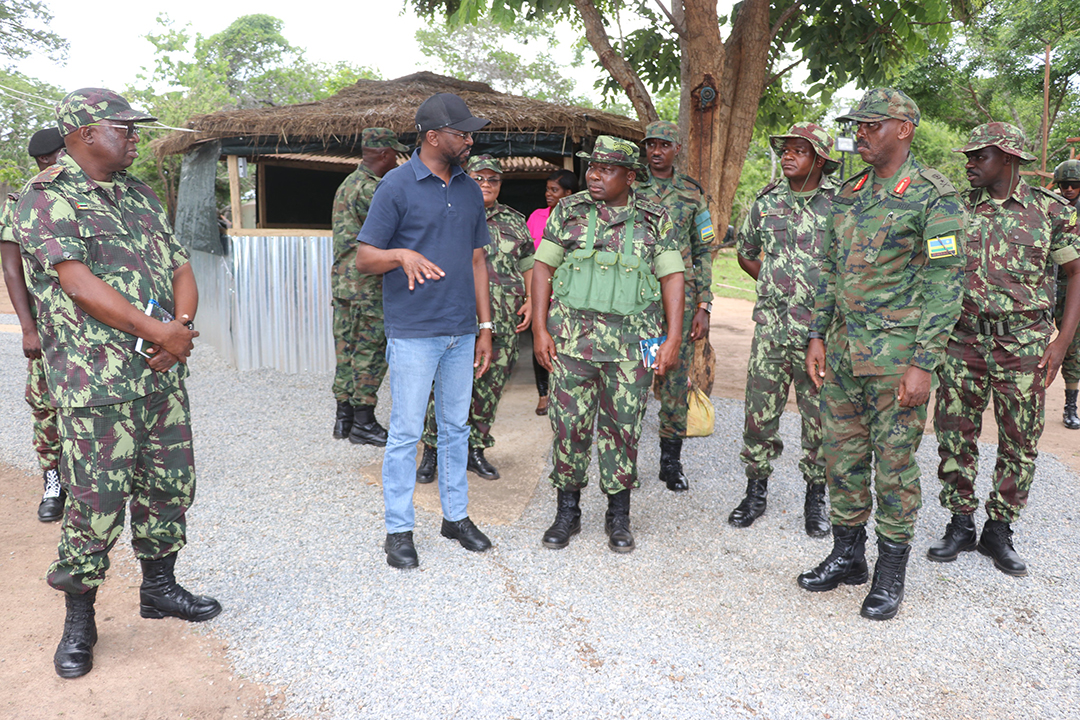Weakened Insurgency Still a Threat to Mozambique
ADF STAFF
Mozambican Minister of National Defense Cristóvão Chume was surrounded by a small group of reporters and Soldiers when he delivered a message to the people of Muidumbe village about the resilience of Cabo Delgado’s insurgent forces.
“They live here in the community, maybe some are in here right now,” he said on February 21 with a wave of his hand toward a larger group of onlookers who stood and sat in the shade, just outside of the impromptu media scrum.
“But we are catching them. We will not rest until we catch them all.”
Five days later, 10 rebels attacked the nearby village of Muambula, killing one and injuring several. Many of the residents fled to other villages in the Muidumbe district.
Violent extremists continue to cause death, displacement and destruction in Mozambique’s Cabo Delgado province, despite recent reports that suggest a diminished insurgency.
South Africa-based terrorism analyst Jasmine Opperman said that about five groups operate between Macomia, Muidumbe, Nangade, Mueda and as far to the southwest as the province’s second-largest city, Montepuez.
The cells form, break up and regroup, depending on their objectives. Those that engage security forces do so in larger groups of 30 to 40, while small groups of five to 10 can attack villages for supplies.
“Clearly the insurgents are still on the move,” Opperman told ADF. “Yes, their numbers are not comparable to three or four years back, but the abilities to sustain attacks, to target vehicles, to use IEDs [improvised explosive devices], is indicative of an insurgency not near defeat.”
A February 13 report by the United Nations said the number of insurgent fighters has declined steeply with the arrival of security forces from the Southern African Development Community mission in Mozambique.
“The deployment of regional forces in Cabo Delgado province has had a significant impact on Ahlu Sunna wal-Jama’a (ASWJ), disrupting its leadership, command structures and bases,” the U.N. said.
The U.N report cited an estimate that ASWJ now has some 280 fighters, down from previous reports of 2,500 fighters.
“Surviving fighters are hardened combatants, able to move and strike strategically, relying on independent and well-established local networks for support, skills and a flow of foreign fighters,” the report stated.
“ASWJ fighters showed enhanced strategic and tactical coordination, forcing the overextension of regional forces by launching attacks against civilians, internally displaced persons, safe havens and strategic mining concerns in northern, central and southern Cabo Delgado.”
ASWJ, also known as Islamic State-Mozambique, has managed to expand its theater of operations to Nampala province to the south.
“The terrorists have split into small groups,” Chume said. “It is these small groups that continue to constitute a great challenge for us.
“They continue to terrorize the population, burning towns, burning vehicles, killing people. We have been improving our ability to pursue terrorists, which can be seen by the feeling of security in this district of Muidumbe.”
About 54,000 residents — more than half of the estimated population of the district — have returned after fleeing the violence, according to district administrator Saide Ali Shabane.
But that sense of peace was short-lived for some.
Chume, a general who was previously commander of the Mozambican Armed Defence Forces, called upon the residents of Muidumbe and other districts affected by terrorism to be vigilant and to provide information on extremists who have infiltrated the population.
The capacity to terrorize, Opperman said, remains more relevant than the insurgents’ numbers.
“There’s clearly still a persistent momentum in keeping the insurgency going,” she said. “It’s about what they have, how they use it and how they maintain an ability to instill fear in the hearts of communities, even in the outer areas of Mocimboa da Praia or Palma.
“So the situation remains fragile for those returning. Hence a normalization narrative or talking about peace in Cabo Delgado is jumping the gun.”


Comments are closed.